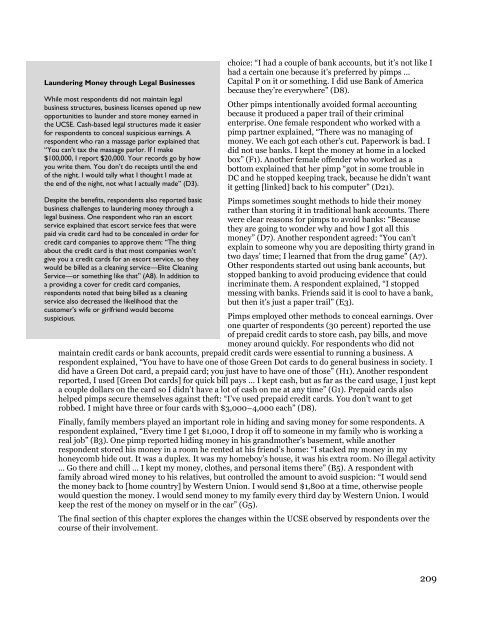413047-Underground-Commercial-Sex-Economy
413047-Underground-Commercial-Sex-Economy
413047-Underground-Commercial-Sex-Economy
Create successful ePaper yourself
Turn your PDF publications into a flip-book with our unique Google optimized e-Paper software.
Laundering Money through Legal Businesses<br />
While most respondents did not maintain legal<br />
business structures, business licenses opened up new<br />
opportunities to launder and store money earned in<br />
the UCSE. Cash-based legal structures made it easier<br />
for respondents to conceal suspicious earnings. A<br />
respondent who ran a massage parlor explained that<br />
“You can’t tax the massage parlor. If I make<br />
$100,000, I report $20,000. Your records go by how<br />
you write them. You don’t do receipts until the end<br />
of the night. I would tally what I thought I made at<br />
the end of the night, not what I actually made” (D3).<br />
Despite the benefits, respondents also reported basic<br />
business challenges to laundering money through a<br />
legal business. One respondent who ran an escort<br />
service explained that escort service fees that were<br />
paid via credit card had to be concealed in order for<br />
credit card companies to approve them: “The thing<br />
about the credit card is that most companies won’t<br />
give you a credit cards for an escort service, so they<br />
would be billed as a cleaning service—Elite Cleaning<br />
Service—or something like that” (A8). In addition to<br />
a providing a cover for credit card companies,<br />
respondents noted that being billed as a cleaning<br />
service also decreased the likelihood that the<br />
customer’s wife or girlfriend would become<br />
suspicious.<br />
choice: “I had a couple of bank accounts, but it’s not like I<br />
had a certain one because it’s preferred by pimps …<br />
Capital P on it or something. I did use Bank of America<br />
because they’re everywhere” (D8).<br />
Other pimps intentionally avoided formal accounting<br />
because it produced a paper trail of their criminal<br />
enterprise. One female respondent who worked with a<br />
pimp partner explained, “There was no managing of<br />
money. We each got each other’s cut. Paperwork is bad. I<br />
did not use banks. I kept the money at home in a locked<br />
box” (F1). Another female offender who worked as a<br />
bottom explained that her pimp “got in some trouble in<br />
DC and he stopped keeping track, because he didn’t want<br />
it getting [linked] back to his computer” (D21).<br />
Pimps sometimes sought methods to hide their money<br />
rather than storing it in traditional bank accounts. There<br />
were clear reasons for pimps to avoid banks: “Because<br />
they are going to wonder why and how I got all this<br />
money” (D7). Another respondent agreed: “You can’t<br />
explain to someone why you are depositing thirty grand in<br />
two days’ time; I learned that from the drug game” (A7).<br />
Other respondents started out using bank accounts, but<br />
stopped banking to avoid producing evidence that could<br />
incriminate them. A respondent explained, “I stopped<br />
messing with banks. Friends said it is cool to have a bank,<br />
but then it’s just a paper trail” (E3).<br />
Pimps employed other methods to conceal earnings. Over<br />
one quarter of respondents (30 percent) reported the use<br />
of prepaid credit cards to store cash, pay bills, and move<br />
money around quickly. For respondents who did not<br />
maintain credit cards or bank accounts, prepaid credit cards were essential to running a business. A<br />
respondent explained, “You have to have one of those Green Dot cards to do general business in society. I<br />
did have a Green Dot card, a prepaid card; you just have to have one of those” (H1). Another respondent<br />
reported, I used [Green Dot cards] for quick bill pays … I kept cash, but as far as the card usage, I just kept<br />
a couple dollars on the card so I didn’t have a lot of cash on me at any time” (G1). Prepaid cards also<br />
helped pimps secure themselves against theft: “I’ve used prepaid credit cards. You don’t want to get<br />
robbed. I might have three or four cards with $3,000–4,000 each” (D8).<br />
Finally, family members played an important role in hiding and saving money for some respondents. A<br />
respondent explained, “Every time I get $1,000, I drop it off to someone in my family who is working a<br />
real job” (B3). One pimp reported hiding money in his grandmother’s basement, while another<br />
respondent stored his money in a room he rented at his friend’s home: “I stacked my money in my<br />
honeycomb hide out. It was a duplex. It was my homeboy’s house, it was his extra room. No illegal activity<br />
… Go there and chill … I kept my money, clothes, and personal items there” (B5). A respondent with<br />
family abroad wired money to his relatives, but controlled the amount to avoid suspicion: “I would send<br />
the money back to [home country] by Western Union. I would send $1,800 at a time, otherwise people<br />
would question the money. I would send money to my family every third day by Western Union. I would<br />
keep the rest of the money on myself or in the car” (G5).<br />
The final section of this chapter explores the changes within the UCSE observed by respondents over the<br />
course of their involvement.<br />
209


